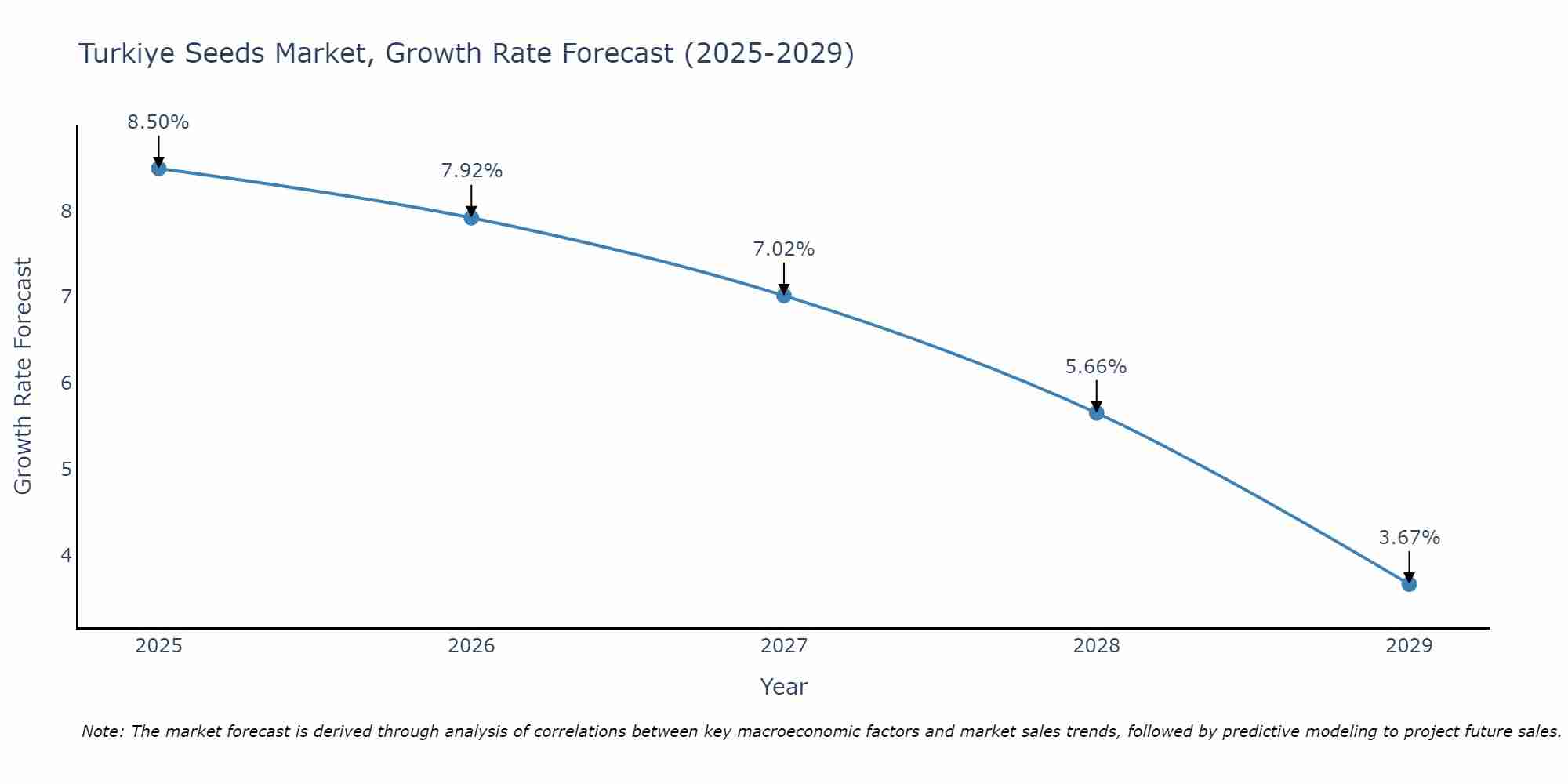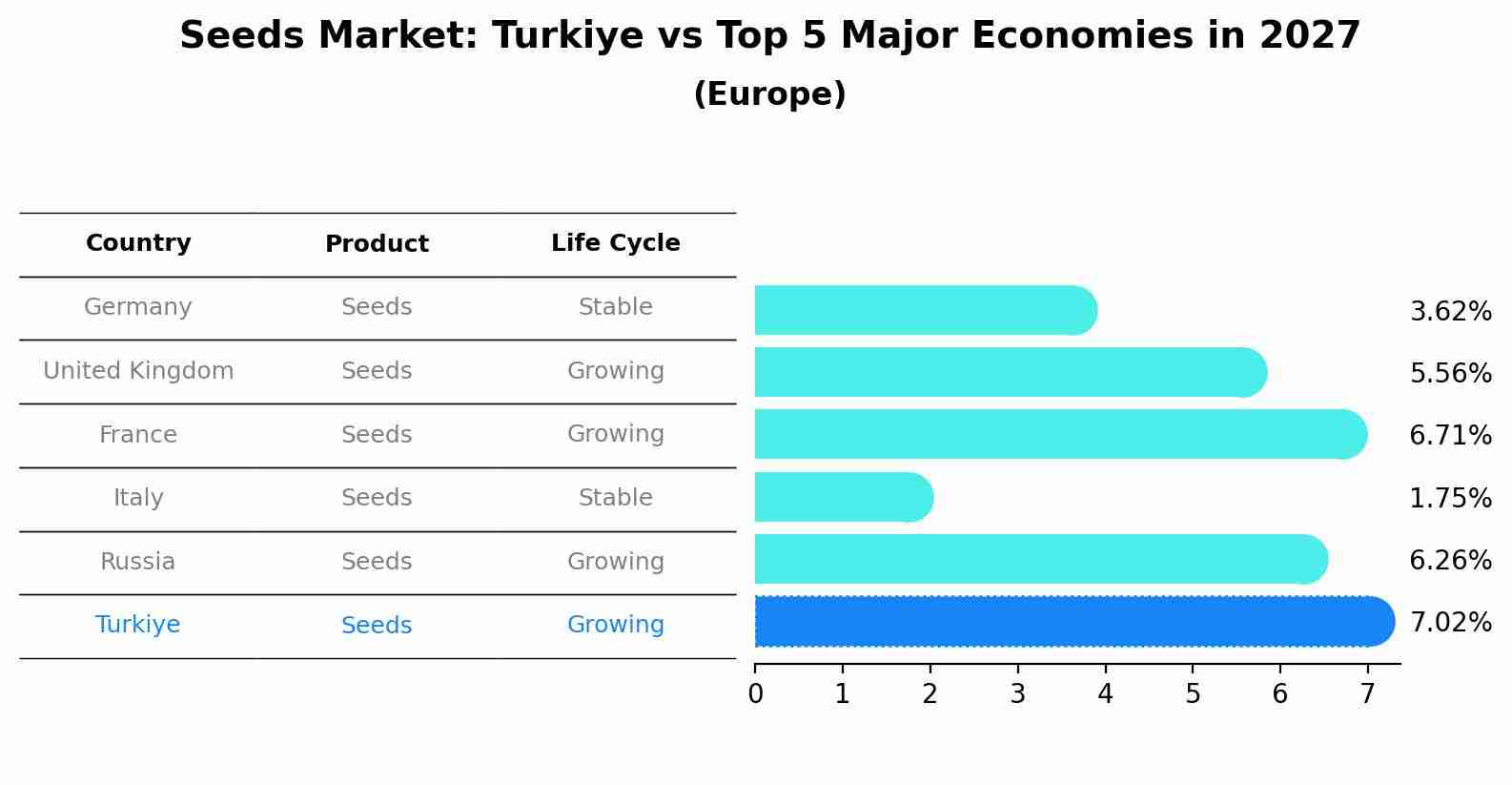Turkey Seeds Market Outlook | Analysis, Companies, Forecast, Revenue, Share, Industry, Trends, COVID-19 IMPACT, Value, Size & Growth
| Product Code: ETC384698 | Publication Date: Aug 2022 | Updated Date: Jul 2025 | Product Type: Market Research Report | |
| Publisher: 6Wresearch | Author: Bhawna Singh | No. of Pages: 75 | No. of Figures: 35 | No. of Tables: 20 |
Turkiye Seeds Market Size Growth Rate
The Turkiye Seeds Market may undergo a gradual slowdown in growth rates between 2025 and 2029. Beginning strongly at 8.50% in 2025, growth softens to 3.67% in 2029.

Seeds Market: Turkiye vs Top 5 Major Economies in 2027 (Europe)
Turkiye's Seeds market is anticipated to experience a growing growth rate of 7.02% by 2027, reflecting trends observed in the largest economy Germany, followed by United Kingdom, France, Italy and Russia.

Turkey Seeds Market Synopsis
The Turkey seeds market is experiencing significant growth due to increasing demand for seeds in agriculture and gardening sectors. The market offers a wide range of seeds including cereals, vegetables, fruits, and pulses. Factors such as growing population, changing dietary preferences, and government initiatives to promote agriculture contribute to the market expansion. Key players in the market are focusing on product innovation, research & development, and strategic partnerships to gain a competitive edge. Additionally, the adoption of advanced technologies like hybrid seeds, genetically modified seeds, and seed treatment techniques further boosts market growth. The increasing awareness about sustainable farming practices and the shift towards organic farming are also driving the demand for high-quality seeds in Turkey.
Turkey Seeds Market Trends
The Turkey Seeds Market is experiencing several key trends. One notable trend is the increasing demand for genetically modified (GM) seeds, particularly in the maize and cotton segments, as they offer benefits such as higher yields and resistance to pests and diseases. Another trend is the growing popularity of organic and non-GMO seeds, driven by consumer preferences for healthier and environmentally sustainable products. Additionally, there is a rising focus on seed technologies that enhance drought tolerance and overall crop resilience, in response to the challenges posed by climate change. The market is also witnessing a shift towards online seed purchases, as digital platforms provide convenience and access to a wider range of seed varieties for farmers. Overall, these trends are shaping the Turkey Seeds Market towards greater innovation and sustainability.
Turkey Seeds Market Challenges
In the Turkey seeds market, challenges include fluctuations in weather patterns affecting crop yields, regulatory hurdles for genetically modified seeds, competition from imported seeds, and limited access to advanced agricultural technologies for small-scale farmers. Additionally, concerns related to seed quality and authenticity, such as the presence of counterfeit or low-quality seeds in the market, pose a challenge for both farmers and seed companies. Market fragmentation and lack of standardized practices further complicate the industry, making it challenging for players to navigate and establish a strong market presence. Overall, addressing these challenges requires investment in research and development, adoption of sustainable farming practices, and collaboration among key stakeholders to drive innovation and ensure the long-term growth of the Turkey seeds market.
Turkey Seeds Market Investment Opportunities
The Turkey Seeds Market offers promising investment opportunities in various sectors, including the production and distribution of high-quality seeds for agriculture. With a growing demand for improved crop yields and sustainable farming practices, investing in seed technology companies that focus on developing genetically modified seeds or hybrid varieties can be lucrative. Additionally, there is a rising trend in organic and non-GMO seeds, presenting opportunities for investment in organic seed producers. Furthermore, the increasing awareness about the importance of seed quality and crop diversity is driving investments in seed banks and preservation initiatives. Overall, the Turkey Seeds Market provides a diverse range of investment options catering to different segments of the agricultural industry, making it an attractive market for potential investors.
Jordan Agar Market Government Policies
The Turkish government has implemented various policies to support the seeds market, focusing on increasing domestic production and enhancing agricultural sustainability. Key initiatives include subsidies for farmers to encourage the use of high-quality seeds, promoting research and development in seed technology, and ensuring the availability of certified seeds. In addition, the government has introduced regulations to control the quality and distribution of seeds, aiming to protect farmers from counterfeit products and ensure agricultural productivity. These policies are designed to boost the competitiveness and efficiency of the Turkey seeds market, ultimately contributing to the growth of the agriculture sector and food security in the country.
Turkey Seeds Market Future Outlook
The future outlook for the Turkey Seeds Market appears promising, driven by factors such as increasing demand for high-quality seeds to enhance crop yield and quality, technological advancements in seed breeding techniques, and growing awareness among farmers regarding the benefits of using genetically modified seeds. Additionally, the government`s initiatives to promote sustainable agriculture practices and address food security concerns are expected to further fuel market growth. However, challenges such as changing climatic conditions and stringent regulations on seed production and distribution may pose some hindrances. Overall, the Turkey Seeds Market is likely to witness steady growth in the coming years, with a focus on innovation and sustainability shaping the industry landscape.
Key Highlights of the Report:
- Turkey Seeds Market Outlook
- Market Size of Turkey Seeds Market, 2021
- Forecast of Turkey Seeds Market, 2031
- Historical Data and Forecast of Turkey Seeds Revenues & Volume for the Period 2018 - 2031
- Turkey Seeds Market Trend Evolution
- Turkey Seeds Market Drivers and Challenges
- Turkey Seeds Price Trends
- Turkey Seeds Porter's Five Forces
- Turkey Seeds Industry Life Cycle
- Historical Data and Forecast of Turkey Seeds Market Revenues & Volume By Type for the Period 2018 - 2031
- Historical Data and Forecast of Turkey Seeds Market Revenues & Volume By Genetically Modified (GM) Seed for the Period 2018 - 2031
- Historical Data and Forecast of Turkey Seeds Market Revenues & Volume By Conventional Seed for the Period 2018 - 2031
- Historical Data and Forecast of Turkey Seeds Market Revenues & Volume By Crop for the Period 2018 - 2031
- Historical Data and Forecast of Turkey Seeds Market Revenues & Volume By Field Crops for the Period 2018 - 2031
- Historical Data and Forecast of Turkey Seeds Market Revenues & Volume By Fruit & Vegetable Crops for the Period 2018 - 2031
- Historical Data and Forecast of Turkey Seeds Market Revenues & Volume By Availability for the Period 2018 - 2031
- Historical Data and Forecast of Turkey Seeds Market Revenues & Volume By Commercial Seeds for the Period 2018 - 2031
- Historical Data and Forecast of Turkey Seeds Market Revenues & Volume By Saved Seeds for the Period 2018 - 2031
- Historical Data and Forecast of Turkey Seeds Market Revenues & Volume By Seed Treatment for the Period 2018 - 2031
- Historical Data and Forecast of Turkey Seeds Market Revenues & Volume By Treated for the Period 2018 - 2031
- Historical Data and Forecast of Turkey Seeds Market Revenues & Volume By Untreated for the Period 2018 - 2031
- Historical Data and Forecast of Turkey Seeds Market Revenues & Volume By Seed Trait for the Period 2018 - 2031
- Historical Data and Forecast of Turkey Seeds Market Revenues & Volume By Herbicide Tolerant for the Period 2018 - 2031
- Historical Data and Forecast of Turkey Seeds Market Revenues & Volume By Insecticide Resistant for the Period 2018 - 2031
- Historical Data and Forecast of Turkey Seeds Market Revenues & Volume By Other Stacked Traits for the Period 2018 - 2031
- Turkey Seeds Import Export Trade Statistics
- Market Opportunity Assessment By Type
- Market Opportunity Assessment By Crop
- Market Opportunity Assessment By Availability
- Market Opportunity Assessment By Seed Treatment
- Market Opportunity Assessment By Seed Trait
- Turkey Seeds Top Companies Market Share
- Turkey Seeds Competitive Benchmarking By Technical and Operational Parameters
- Turkey Seeds Company Profiles
- Turkey Seeds Key Strategic Recommendations
Frequently Asked Questions About the Market Study (FAQs):
- Single User License$ 1,995
- Department License$ 2,400
- Site License$ 3,120
- Global License$ 3,795
Search
Thought Leadership and Analyst Meet
Our Clients
Related Reports
- Canada Oil and Gas Market (2026-2032) | Share, Segmentation, Value, Industry, Trends, Forecast, Analysis, Size & Revenue, Growth, Competitive Landscape, Outlook, Companies
- Germany Breakfast Food Market (2026-2032) | Industry, Share, Growth, Size, Companies, Value, Analysis, Revenue, Trends, Forecast & Outlook
- Australia Briquette Market (2025-2031) | Growth, Size, Revenue, Forecast, Analysis, Trends, Value, Share, Industry & Companies
- Vietnam System Integrator Market (2025-2031) | Size, Companies, Analysis, Industry, Value, Forecast, Growth, Trends, Revenue & Share
- ASEAN and Thailand Brain Health Supplements Market (2025-2031) | Strategy, Consumer Insights, Analysis, Investment Trends, Opportunities, Growth, Size, Share, Industry, Revenue, Segments, Value, Segmentation, Supply, Forecast, Restraints, Outlook, Competition, Drivers, Trends, Demand, Pricing Analysis, Competitive, Strategic Insights, Companies, Challenges
- ASEAN Bearings Market (2025-2031) | Strategy, Consumer Insights, Analysis, Investment Trends, Opportunities, Growth, Size, Share, Industry, Revenue, Segments, Value, Segmentation, Supply, Forecast, Restraints, Outlook, Competition, Drivers, Trends, Demand, Pricing Analysis, Competitive, Strategic Insights, Companies, Challenges
- Europe Flooring Market (2025-2031) | Outlook, Share, Industry, Trends, Forecast, Companies, Revenue, Size, Analysis, Growth & Value
- Saudi Arabia Manlift Market (2025-2031) | Outlook, Size, Growth, Trends, Companies, Industry, Revenue, Value, Share, Forecast & Analysis
- Uganda Excavator, Crane, and Wheel Loaders Market (2025-2031) | Strategy, Consumer Insights, Analysis, Investment Trends, Opportunities, Growth, Size, Share, Industry, Revenue, Segments, Value, Segmentation, Supply, Forecast, Restraints, Outlook, Competition, Drivers, Trends, Demand, Pricing Analysis, Competitive, Strategic Insights, Companies, Challenges
- Rwanda Excavator, Crane, and Wheel Loaders Market (2025-2031) | Strategy, Consumer Insights, Analysis, Investment Trends, Opportunities, Growth, Size, Share, Industry, Revenue, Segments, Value, Segmentation, Supply, Forecast, Restraints, Outlook, Competition, Drivers, Trends, Demand, Pricing Analysis, Competitive, Strategic Insights, Companies, Challenges
Industry Events and Analyst Meet
Whitepaper
- Middle East & Africa Commercial Security Market Click here to view more.
- Middle East & Africa Fire Safety Systems & Equipment Market Click here to view more.
- GCC Drone Market Click here to view more.
- Middle East Lighting Fixture Market Click here to view more.
- GCC Physical & Perimeter Security Market Click here to view more.
6WResearch In News
- Doha a strategic location for EV manufacturing hub: IPA Qatar
- Demand for luxury TVs surging in the GCC, says Samsung
- Empowering Growth: The Thriving Journey of Bangladesh’s Cable Industry
- Demand for luxury TVs surging in the GCC, says Samsung
- Video call with a traditional healer? Once unthinkable, it’s now common in South Africa
- Intelligent Buildings To Smooth GCC’s Path To Net Zero


















